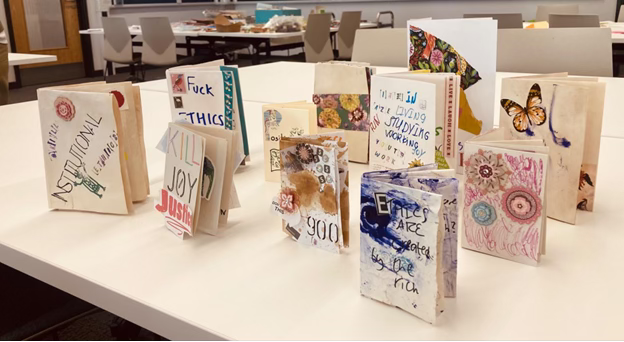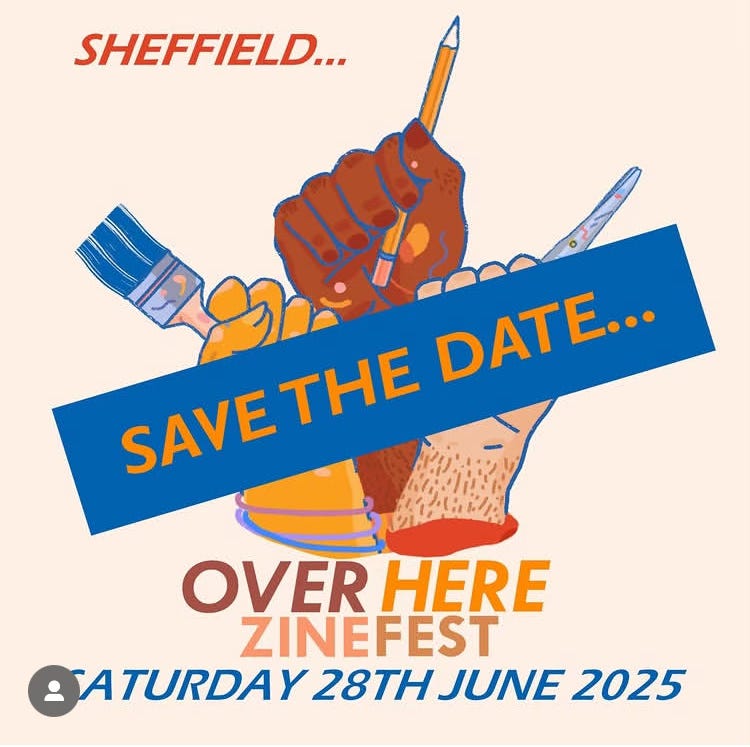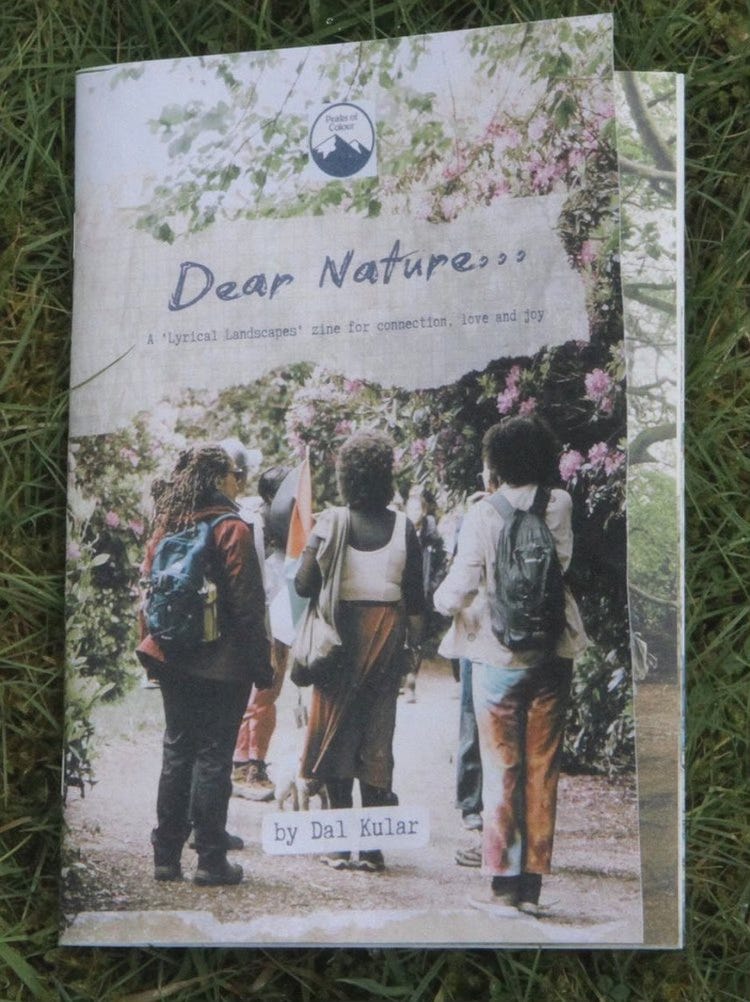Hello lovely folks. I’m really excited to be sharing my love and experiences of the transformational power of intuitive zine-making in this two-part article series originally commissioned and published by Synergi*, a brilliant grassroots organisation that focuses, ‘…on the intersection between racial justice & mental health, distress or trauma.’ Please do check out their change-making world-remaking work. I’m very grateful to Alaina Heath and the Synergi team for permission to share these articles here.
At a time when publishing is becoming increasingly inaccessible and fewer Black and Brown folks are being published than before 2020, my belief in the power of low-fi, DIY self-publishing is strengthened more than ever. If they are not going to publish us (or only publish the 3% who manage to breakthrough), then we need to self-determine and publish ourselves more than ever. And then we need to distribute, share and uplift each other’s work more than ever. This is creative resistance.
Thank you all for your continued support, for reading and sharing my words.
CW: references to racism, mental illness, transgenerational trauma.
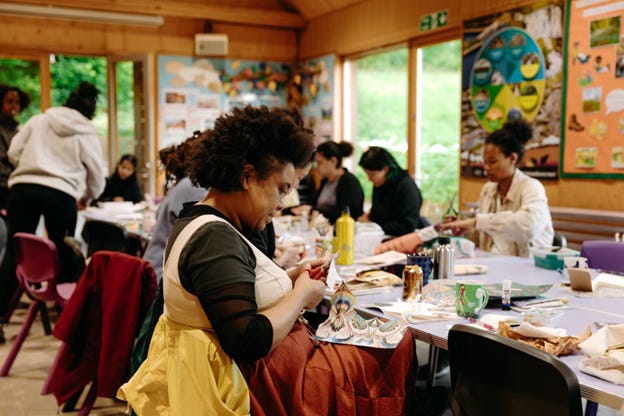
“No matter what happens, you can always make a zine. There’s no wrong way of making a zine. Zines can set you free.”
Dr. Sheree Mack, zinester, creatrix and poet.
Zines, those little self-made publications containing uncensored, radical and original content have been circulating underground for decades – hand to hand, via zine fests and distros, at gigs and via our letterboxes. From the margins of riot grrrl to Sweet Thang and especially during and since the pandemic, zines have infiltrated our everyday lives, democratising whose voices get to be heard. Zines are low-fi, diy and anarchic technology that is as simple as taking a single sheet of paper, a pen, maybe some sticky tape and crucially, an idea or an experiment to scribble, type, collage, handwrite across the page(s) and make something original and new. I love this definition of what a zine is or can be by Multitudes Zine Fest,
“A zine [pronounced like the ‘zine’ part of ‘magazine] is an independently created low-budget publication that can hold whatever you wish – poems, personal stories, political tracts, comics, artwork, recipes or rants. It might be a single author thing or holding the work of lots of contributors. It can be handwritten, typed, cut and paste with scissors and glue, or assembled on a computer. It’s like a mini magazine, a pamphlet, a love note. It might be a one-off thing, or a long-standing affair of many many issues. Either way, it’s usually only published as a short print run, often printed on a photocopier.”
In a hierarchical world being flooded with AI generated wor(l)ds and ideas, the ever increasing digital surveillance and censorship of our lives and data harvesting, and the corporate extraction of grassroot creative ideas which then become the next marketing buzz word, zines offer an analogue alternative to this by creating, practicing and sharing our knowledges between us in a way that is useless to capitalism and big data collection. This is otherwise creative production.
The unruly freedom of zines affords space for our individual and collective imaginings, healings, conjurings, creatings, philosophisings, rantings, ragings, engagings, playings, ponderings, possibilisings, root-makings, community-makings, connectings, thinkings, re-arrangings.
Pamphlets, flyers, posters and booklets containing seditious and revolutionary ideas distributed openly or secretly to garner support and solidarity have long been a part of meaningful change in many societies. Our beautiful world needs our wildest imagineering to conjure new possibilities for our collective future, at a time that feels like the end of time.
Within zines we can proffer skills, wisdom, healing resources, stories, transmission of ancestral knowledges whereby they can become a compass and a guide to alternative ways of being, surviving and thriving outside of empire, outside of punitive systems and overcultures. These tiny tomes could become invaluable resources for our future generations. Zines are counter-narrative to mainstream publishing norms, systems and institutions. Here our voices become amplified. We unsilence and we disrupt. We inspire each other in the process of making, sharing and reading.
Although zine distribution may be small, the impact of a zine can be massive, having ripple effects both on the maker and the readers. Zine-making can increase creative and personal confidence, improve mental wellbeing, foster courage and broaden horizons.
Readers of zines can learn about different lives and ways of being and living, get exposed to fresh ideas through the away-from-the-mainstream freedom of creative expression, find a sense of connection and camaraderie, hold a tactile artifact lovingly made, full of vibrations that can stir our subconscious minds. Zines are a joyous and profound technology that can benefit many of us.
Back in January 2020, just months before the covid pandemic locked us in our homes, I experienced the transformative potential of zine-making. I created a zine called ‘Wild Ink’ as part of my autoethnographic research for a masters in therapeutic writing exploring my identity, creativity and wildness using therapeutic zine-making methods. I wanted to understand the intersections of these in relation to my creative exile, and eventually, my creative return.
***
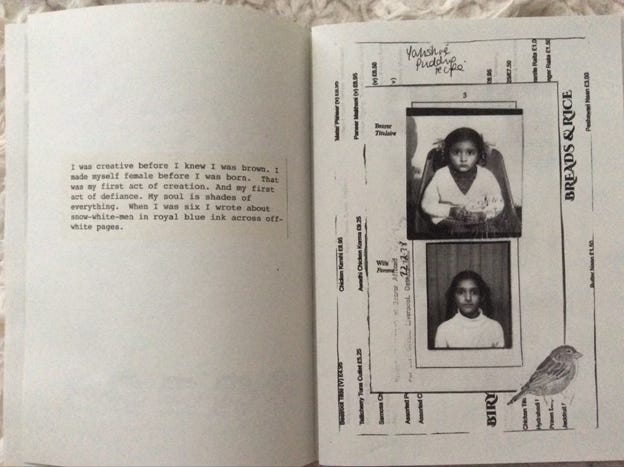
As a creative and mischievous child of working class Punjabi Sikh immigrant parents, I knew I wanted to be a writer from the age of six. By the time I reached comprehensive school my writing dreams began eroding. Being placed in the worst class in the school, my pubescent hormones raged and my neurowildness began to emerge. The almost daily racism and the sheer boredom of lessons led me to becoming a school refuser.
As a teenage fugitive I learnt the art of aimless roaming, hanging out in local parks and supermarket rooftops, writing poems and pretending to smoke herbal cigarettes. At 16 years old the school careers officer told me I could never be a writer and that I needed to get a proper job. I left school with 3 O-levels and signed on the dole.
This was the mid-eighties’s Up North, still reeling from Enoch Powell’s 1968 Rivers of Blood Speech and the miners strikes and all too frequent overt racism which sometimes meant physical attacks needing physical defence. I had no role models to look up to that looked like me who were from my background and who were creatives, even though I came from a profoundly creative cultural heritage.
Crucially, I didn’t have that one person who told me, ‘you can do this’. As a kid I really needed that. These childhood experiences shaped the following decades of my life with that young writer haunting me all the way.
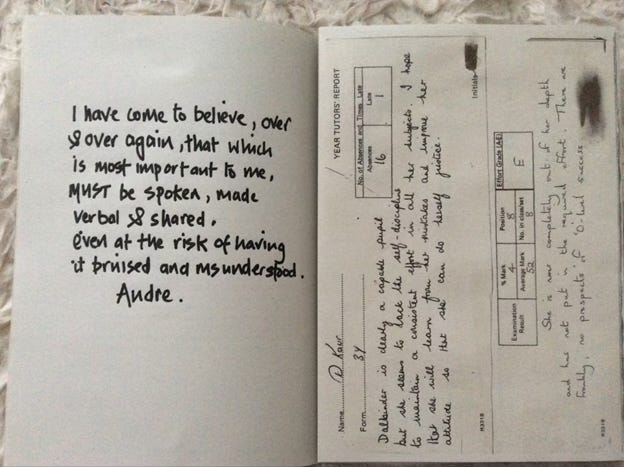
Making the Wild Ink zine became an experimental space to unravel aspects of my life and myself which had been hidden, smothered, colonised and suppressed for most of my adult life. It was my chance to re-historise. As an intuitively guided process, by the time I’d finished the zine it felt as if it had exploded into my life like a huge masala-mix firework, sending fragrant sparks far and wide, across timelines, histories, memories and landscapes. It felt healing, illuminating and cleansing.
Wild Ink helped me to realise that it had taken me over thirty years to find and heal my creative heart and creative inner child. Poems in the zine revealed to me the cost of not following my creative impulses, especially on my mental health. It also helped me find my creative soul again and heal my ‘forever interrupted tongue’, (Dutta, 2017) a tongue interrupted by empire, partition and migration.
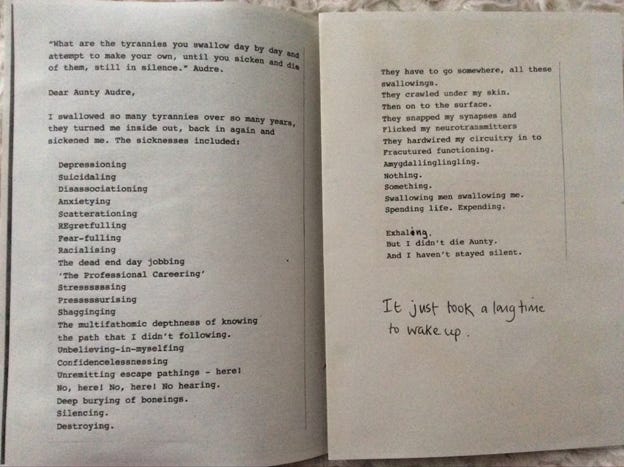
Part two coming soon…
Original article published here. Huge gratitude to Synergi for this opportunity.





